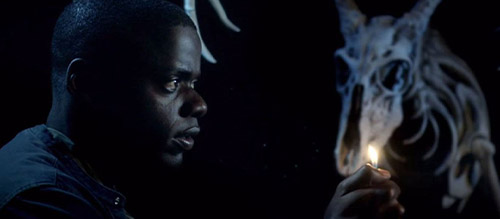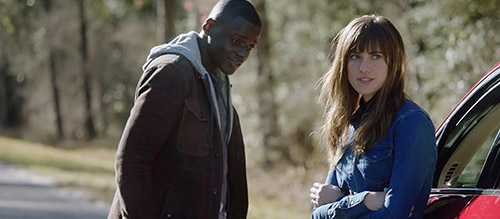Get Out (2017) Review
Get Out (2017)
Director: Jordan Peele
Screenwriter: Jordan Peele
Starring: Daniel Kaluuya, Allison Williams, Bradley Whitford, Catherine Keener, Lakeith Stanfield, Caleb Landry Jones, Lil Rel Howery, Betty Gabriel, Marcus Henderson
Get Out was Jordan Peele’s directorial debut in 2017, and was a massive box office success that was nominated for Best Picture at the Oscars. It follows photographer Chris Washington as he heads into rural upstate New York with his white girlfriend, Rose Armitage, to meet her family. Whilst spending the weekend on their vast estate, he is constantly unsettled by the atmosphere around him, and by the behaviours of the two black workers. Eventually, the secret is revealed: the Armitage family is part of a cult that partially transplants the brains of old white people into the bodies of fit and healthy black people, keeping their ‘true’ natures controlled though a method of hypnosis which sends their consciousness’ into the ‘sunken place’.
It is the perfect concoction of psychological tension and a building feeling of dread, with a minimal yet effective soundtrack that acts more as a backbone than a focal point. It also presents a lot of interesting themes about race and white supremacy. In rewatching Get Out in 2020, after the Black Lives Matter protests, this film hits different.
Get Out is definitely a film that benefits from multiple viewings. Things that were off in the first viewing and only make sense after the film’s twist, are so much more prominent and almost weirder upon a second viewing, even when you know why it’s happening. It’s almost like watching two completely different films, but in the best way possible.
Daniel Kaluuya is the protagonist Chris Washington and he was the first black lead character in a horror film released in the 2010s. His performance secured Kaluuya multiple nominations and awards, including a BAFTA ‘Rising Star’ award. He truly takes us on an emotionally wrought journey that starts with caution, leading into exhaustion, and ending with fury. There is shot at the end, in which he is sat in a police car, which is particularly harrowing. His face is that of a broken man. Alongside him, Allison Williams is girlfriend Rose Armitage. Williams has you believing her good intentions right up until that last second, but upon a rewatch her smile is truly that of a predator looking at its prey, Williams balancing sweet, doe-eyed girlfriend perfectly with cold-hearted sociopath. It’s actually frightening.
The supporting cast is truly brilliant, too. Catherine Keener and Bradley Whitford are Rose’s parents, hypnotherapist Missy and neurosurgeon Dean respectively. Caleb Landry Jones in particular gives a chilling performance as the brother, Jeremy, whose mere presence on screen has every fight or flight response in your body popping off like mad. Lil Rel Howery is Chris’ best friend, TSA Agent Rod Williams, and provides some much needed comic relief at key points in the film. His scenes serve as breathing room once the events back at the Armitage estate really begin to run together. This is such high praise for the writing, as this character’s comedy doesn’t cheapen the movie, instead providing a release whilst still serving the overall serious tone.
Lakeith Stanfield is one of the standouts of the film, giving an amazing performance as a black man snatched from the suburbs only to succumb to the Armitage’s secret cult. In fact, all three of the actors who are victims of the transplant are chillingly wonderful. Betty Gabriel and Marcus Henderson are victims Georgina and Walter respectively, who act as hosts to Rose’s grandparents and appear to work on the estate as housemaid and groundskeeper.
Get Out uses its soundtrack sparingly, but effectively. Michael Abels composed the score and the iconic piece that plays in particular moments of the film to serve as a warning to Chris. “Sikiliza” is written in Swahili and means ‘listen’, with the rest of the lyrics translating ‘run far away’, ‘save yourself’, and ‘listen to the ancestors’. It’s a heavy melody with a chorus of choral harmonies sung by black voices. It is truly haunting and beautiful. The song is heard in moments where Chris is in danger, and seems to warn both him and the audience that something awful is either about to happen, or as with almost everything else in the film, is already happening.
Get Out is a commentary on race and white supremacy. It really does hit in a different way at this point in 2020, and for that reason alone it is essential viewing. The film opens with Stanfield walking alone in a suburban neighbourhood when ‘Run, Rabbit, Run’ can be heard playing from a car which idles up to him and pulls over a few yards ahead. Stanfield turns to walk away, highlighting a poignant message about black people feeling unsafe when walking alone and the desire to stay out of trouble, but is attacked and abducted nonetheless.
As black people playing host to white, Stanfield, Gabriel and Henderson perfectly embody the characteristics and language of old white people. This is another element which is weird upon first watch, and is only really unnervingly obvious upon the second watch when you know why they’re behaving that way. As workers on the estate, Georgina and Walter exhibit unsettling behaviour. They don’t understand Chris’ slang when he talks to them and Walter is seen running in the garden at night, Georgina seen on multiple occasions admiring her reflection. When Chris meets Logan King (Stanfield) at the auction, Logan’s own speech is clipped and he grips Chris’ hand when Chris goes in for a fist bump. It’s weird. It’s unsettling. But then you remember that the grandfather lost the Olympics to Jesse Owens, and now here he is in a black body, enjoying speed and agility. Everything falls so neatly into place that if it wasn’t so mental it would almost be satisfying.
The Armitage’s deaths, aside from Rose’s, are all linked to heads. Impaled on a stag head, stabbed in the eye (perhaps a nod to old-fashioned ice-pick lobotomies?), and finally stomping on a head. This final blow is dealt with a wall blocking any visual effects and serves to be far more stirring than the gratuitous exhibit itself. This film does an impeccable job of keeping things realistic, yet tasteful. The most graphic scene is in the operating room and even that is done with medical precision and very little blood. Get Out deserves praise, in this regard, for being secure enough in its own horror that it doesn’t need to resort to such displays of gore.
Get Out is a satisfying film in that there is a reasonably happy ending which feels cyclical to the beginning. On their way to the estate in the first act, Rose and Chris are pulled over by a policeman who asks for Chris’ ID. Rose gets angry and stands up for him. At the end of the film, Chris is in a provocative position lying over Rose who is bleeding from the gut (like the deer they hit) when the police car arrives. She reaches towards it and begs for help in a subversion of her former behaviour. Chris looks terrified. It’s a harrowing image of how black men fear the police and being framed for something they didn’t do. As the audience, we know he is innocent and it’s a nail-biting moment to see what will happen next. It’s almost like Chekov’s copper… except he never turns up. Instead, it’s Rodney, whose appearance provides such a visceral feeling of relief.
There is so much to say about Get Out. Every single scene could easily be dissected and analysed, but overall it is an exceptional display of exemplary directing, scoring and writing, and is a film that really will stay with you until long after you’ve seen it.
24/24
Recommended for you: 10 Best Horror Movies of the 2010s
You can support Darcy Rae in the following places:
Twitter – @dxrcyer
Instagram – @dxrcyer
Etsy Store – DEWildeArt



